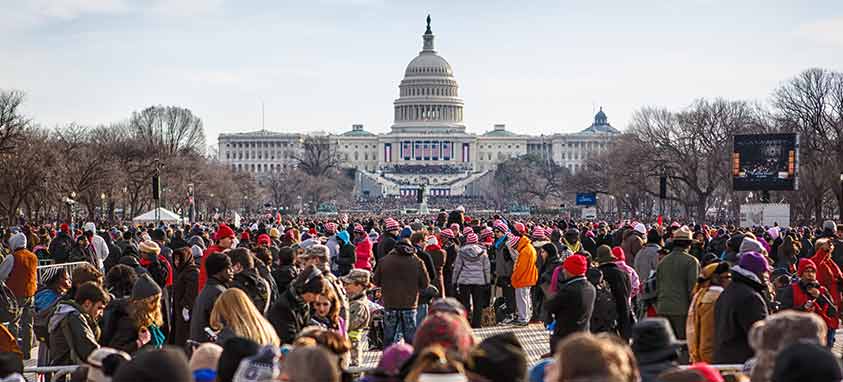What could be one of the most controversial presidential inaugurations in U.S history is happening in just a few days. On Jan. 20, president-elect Donald Trump will be sworn into office, and nearly one million Americans are expected to travel to Washington, DC, to either attend the inauguration or protest it. People will be buzzing about this event for years to come, which means it surely offers some important lessons that meeting planners will appreciate. These are a few of the pointers you can take from the 2017 presidential inauguration.
1. Book early
If you want to keep your event under budget and book rooms at the best hotels, be sure to book early. It’s an obvious and often-used tip, but sometimes procrastination can get the best of us.
The presidential inauguration illustrates clearly why booking early is so important. In December, just 15 percent of hotels in the Washington, DC, metropolitan area had vacancies for inauguration weekend—and prices had risen by more than three times the usual rate, to around $500 a night. The president-elect’s own hotel, Trump International Hotel Washington DC, has long been fully booked.
Even Airbnb, which generally has cheaper alternatives to hotels and resorts, offers no relief. Last month, a one-guest rental during the inauguration cost travelers nearly $700, on average. Just 9 percent of listings were available at that time.
2. Make security a priority
With hundreds of VIPs in attendance, security is one of the focal points of this inauguration. The Secret Service has rolled out an elaborate security plan which involves closing more than 100 square blocks of Washington, DC, and deploying 28,000 trained personnel from the U.S. Secret Service, Transportation Security Administration, Federal Bureau of Investigation and several other agencies. The entire operation is expected to cost north of $100 million.
Meeting and event planners probably don’t need a strategy that elaborate, but having a plan in place is paramount. Attendee safety should be a top priority for every planner. On site visits, planners should ask hotels and venues about their crisis management plans. Are the hospitality staff informed, trained and well-practiced in case of an emergency? Are there staff available on-site who can perform first aid if necessary? These are just a few of the questions planners should keep in mind.
3. Embrace the latest technology
Technology is often touted as a tool to make events instantly better. It’s not usually as simple as that, but innovative tech can certainly enhance events, boost attendee enjoyment and provide valuable analytical data.
In order to streamline visitors’ experiences during president-elect Donald Trump’s inauguration, nearly 40 government agencies worked together to create an interactive map that displays important information such as street closures, locations of medical aid stations, public transit stations, the parade route and much more. Computerworld reported that the map uses Esri’s ArcGIS technology, a powerful geographic information system used by the Department of Transportation of Washington, DC. The inauguration map can be used on any web browser, through desktop and mobile devices.
4. Create a transportation strategy
Transportation for massive events such as a citywide convention or presidential inauguration is always a huge task. According to Allianz Global Assistance, Washington, DC, will see a 222 percent increase of travelers during and around the inauguration. The surge of traffic will cause backups in airports, train and bus stations and roads in the area. However, this is nothing compared to the impact that road closures will have on local travel. More than 100 blocks, or 2.7 square miles, will be closed due to security concerns.
When planning a big event, don’t forget to consider transportation during the site selection process. A city with a great public transportation system can be a boon for any event. Attendees at the world’s largest technology convention, CES 2017, benefited greatly from host city Las Vegas’s efficient and easy-to-use monorail system. The monorail operator partnered with a technology company to allow attendees to use their convention badges as tickets, creating a seamless way for guests to travel around the city.
5. Have a backup plan for speakers and entertainment
Speaker mishaps are common in events, and a poorly handled one can mean the difference between a fabulous event and a forgettable dud. It is vital to have a plan in case a keynote speaker or performer cancels or comes down with an illness at the last minute.
Antwone Stigall, CMP, president of West Wing Events in Memphis, Tennessee, suggests that meeting planners include this clause in their contracts with speakers: They must have another person accompany them to the meeting who could give the presentation in their place if necessary. If you are using a speaker who is part of a network of colleagues, it is also possible to include a condition that requires the contracted speaker to provide an alternate if he is unable to perform.




